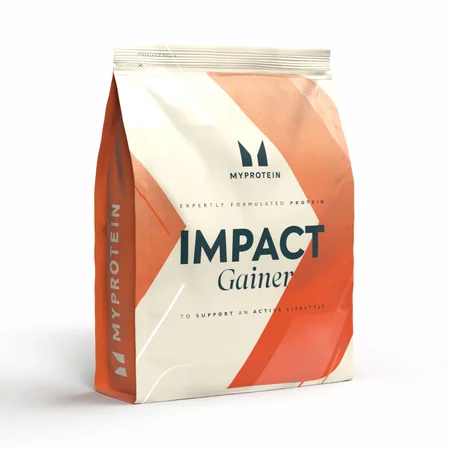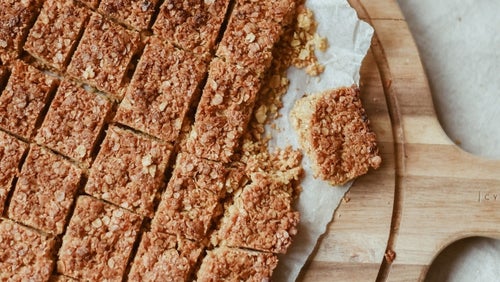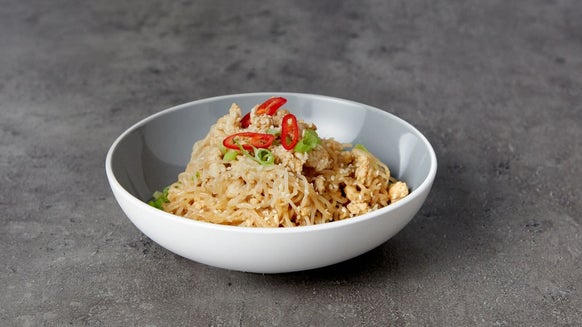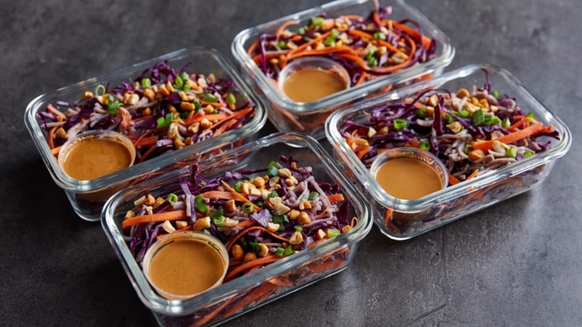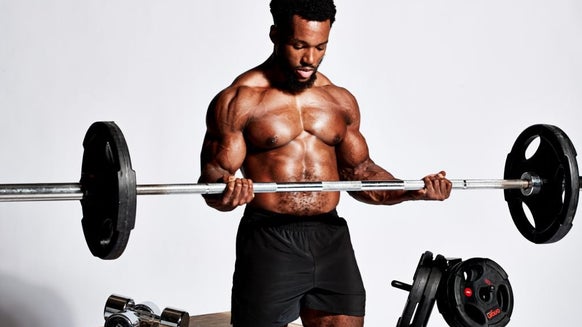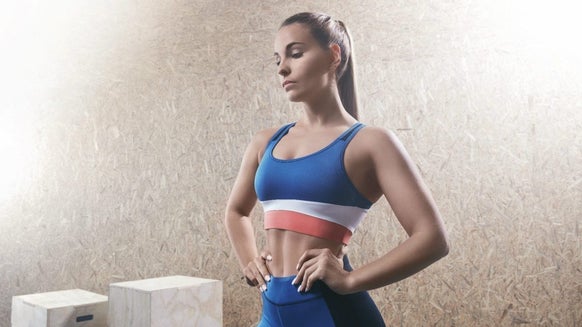
When it comes to nutrition, most of us know to refuel after a workout, but have you given enough thought to what to eat before the gym? The timing, type, and quantity of food you eat before your workout can have a big impact on your performance and how you feel. Here, we’ll cover the basics to help you fuel up for a great sweat session.
Jump to:
- Why is Pre-Workout Nutrition Important?
- What to Eat Before the Gym
- When to Eat Before the Gym
- What Should I Eat 30 Minutes Before a Workout?
- What Workouts Can I Do 30 Minutes After Eating?
- Pre-Workout Meal Ideas
- Hydration
Why is Pre-Workout Nutrition Important?
Pre-workout nutrition is crucial for the body to be prepared for a workout. Would you leave for a road trip with no fuel in your car? You don’t want to jump into a tough training session on empty, either. However, there are three factors to consider when deciding what to eat before a workout.
- How long before your workout do you plan to eat?
- What type of workout are you planning for, and what outcomes are you working towards?
- How long is your training session going to be?
The answers to these three questions are critical when deciding what to eat before the gym. Let’s address each question one at a time.
How long before your workout do you plan to eat? Do you have an hour to grab a quick snack or will you have three hours since your last large meal (and nothing in between)? You may want a meal or a larger snack if the time in between is more than an hour.
Will you work out first thing in the morning, having fasted since 5 or 6pm the night before, or do you have to squeeze in a gym session after lunch and before dinner? The time of day that you train can have a big impact on your energy levels — some people love to train fasted first thing, while others find it’s better after eating a snack or meal.
The next factor to consider is the type of workout you’re planning, which goes hand in hand with your long-term goals. If you’re going to have a leisurely weightlifting session, you might need to fuel for muscle building, versus a short HIIT cardio workout, when you don’t want a lot in your stomach.
If your goals include weight loss, you don’t want to consume too many calories, but if you’re looking to make lean gains, then you need adequate amounts of macros to build muscle.
The final consideration is the length of your workout. If you only have 20 minutes to work hard, then you probably won’t need more food during your workout, but if you’re training for an ultramarathon, you’ll need to be ingesting calories every hour or so.
With all of these factors in mind, let’s consider the macronutrients — carbohydrate, protein, and fat — and the supplements that can make up your ideal pre-workout meal.
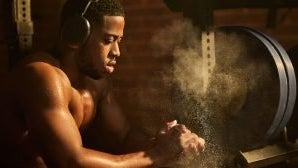
Guide To Pre-Workout | What Is It? When To Take it?
It's time to re-energize your exercise routine....
What to Eat Before the Gym
While some people prefer to exercise on an empty stomach, it’s crucial to have an adequate amount of the following macronutrients in your meals and snacks before you hit the gym.
Carbs
Carbohydrates, or carbs, are the muscles’ main source of energy. During a workout, our muscles pull that energy from carbohydrates in our food for immediate use (glucose), or from extra energy storage in the muscles (glycogen).1
Having carbohydrates in our diets from whole grains, fruits, and vegetables both provides fuel for all muscles throughout the day (including our brain) and helps to maximize those glycogen stores, so we can work out harder and longer and replenish those stores after a challenging workout, helping speed muscle recovery.
Research shows that long-term low-carb diets negatively impact performance in those who exercise heavily.1 Long distance runners and other endurance athletes benefit from ingesting carbohydrates during long training sessions and races (e.g. more than 60 minutes), like energy gels and sports drinks.
Consuming easy sources of glucose can help give an energy boost when your glycogen stores have already been at work. In short, having carbohydrates before a workout primes your energy levels and helps keep your glycogen stores at maximal levels.
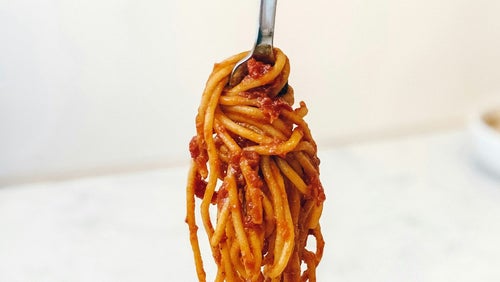
What Is Carb Cycling And How Does It Work? Benefits And Tips
Cutting out carbs... Could you do it?...
Protein
Most athletes know that protein is key to building muscle after a workout, but there’s also a benefit to having protein before a workout. Research shows that consuming protein prior to exercise helps make it more readily available to help build and repair muscle after your workout.2
Consuming protein before a workout gives your body time to digest it and have it broken down into amino acids, which can help with muscle building and repair.
Another study showed equal benefit from the same dose of protein before and after a workout.3 Consuming adequate protein regularly can also help optimize recovery from your last workout, making you ready to perform at your best.1

The Complete Guide To Protein Powders For Beginners
Match your protein to your training....
Fats
Have you ever been on a cardio machine that shows you’re in the “fat-burning zone”? You can think of that as a lower intensity, longer form of exercise — like a moderate jog for more than 20 minutes.
Fats are burned for energy when our muscles have adequate oxygen to use them as energy during aerobic exercise.4 Heart-healthy fats play so many roles in optimal health, so it’s important to consume them regularly.4
Another benefit of healthy fat in your regular diet is satiety — it helps to slow down digestion and keeps you feeling more satisfied for longer, which could prevent overeating. MCT oil is a common form of an easily digestible fat supplement.
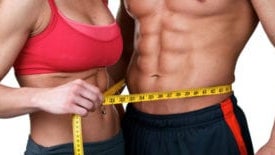
How Much Fat Should You Eat Per Day?
Is it really as bad for you as you think?...
Supplements
Pre-workout supplements have a multitude of benefits based on your goals. If you’re looking to increase power and performance in activities like weightlifting, then creatine has been proven to be effective and safe.5
If you need a little boost of energy half an hour prior to exercise, pre-workout powders containing caffeine and B-vitamins are popular. These pre-workout supplements can delay fatigue and improve performance, which leads to better results over time.6
No matter what supplement you take before your workout, follow the instructions to make sure you consume it with or without food and with adequate water or other fluid for optimal results.
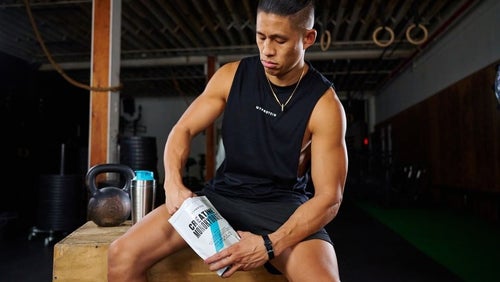
Creatine HCL vs. Monohydrate | Which Is Better?
What is the difference between creatine HCL and creatine monohydrate, and which ...
When to Eat Before the Gym
The "best" time to eat before working out depends on your schedule and preferences. If you’re an early riser, a small, carbohydrate-rich snack before exercise followed by a larger, better-rounded meal is the best way to go.
If you prefer to work out at midday, make sure your breakfast contains plenty of complex carbs and high-quality protein, then eat a smaller carb-rich snack up to an hour before exercise.
At both times, a cup of coffee or caffeine supplement can also provide a helpful boost.
Evening trainers should do similar, focusing on carbohydrates and protein, but may be advised to skip the caffeine so late in the day, as it may disrupt sleep.
What Should I Eat 30 Minutes Before a Workout?
Before working out, you want to eat something that’s quickly and easily digested, with plenty of nutrients and energy. Fortunately, nature has already come up with the perfect pre-workout snack – bananas.
Other excellent pre-exercise nutrition options include bagels, rice cakes, cereal, coconut water, other fruit like pineapple and watermelon, and sports supplements like protein bars, carb gels, and isotonic drinks.
What Workouts Can I Do 30 Minutes After Eating?
Generally, you should wait 30 minutes before engaging in physical activity after eating, but there are some low-impact exercises you can do in this time. Walking and stretching, for instance, can help with digestion and blood flow while getting you prepared for your workout. After half an hour, you’re free to move on to more intense activity like cardio or strength training.

Pre-Workout Meal Ideas
Full meal
If you have 2-3 hours before your workout, consider all three macro components to keep you satisfied and optimally fuelled for exercise. Here are some ideas:
Breakfast - Whole wheat toast (carbs) with peanut butter (fat, protein) and a drizzle of honey (carbs)
- Veggie omelette (protein, fat), banana (carbs)
- Smoothie – frozen fruit (carbs), skim milk (protein, carbs), almond butter (fat)
Lunch or dinner - Whole wheat wrap (carbs) with tuna salad (protein, fat), apple (carbs)
- Pasta (carbs) with shrimp (protein), side salad with vinaigrette (fat)
- Salmon (protein, fat), brown rice (carbs), veggies (carbs)

5 High-Protein Muscle-Building Breakfast Recipes
There’s nothing like the thought of waffles to get you out of bed in the morning...
Heavy snack
If you have 1-2 hours before your workout, a combination snack (more than one macronutrient) is optimal to keep your body ready to work. Think about these options:
- Crackers or fruit (carbs) and cheese (protein, fat)
- Hummus (protein, fat) with pita (carbs)
- Yogurt (protein, carbs) with granola (carbs)
Light snack
If you’re exercising in about an hour or less, a small snack of mostly carbohydrates, which are quickly digested, is your best bet. Try:
- A banana or applesauce
- Wholegrain cereal and milk
- Toast with jam
- Pre-workout mixed with water or juice
Take these ideas and customize the portion sizes to your goals based on how long you plan to work out – you might need to add more protein or carbs to help you stay at the top of your game.
It takes some trial and error to figure out what feels best on your stomach, but these key points about nutrition can help you maximize your energy and performance while you’re at the gym.
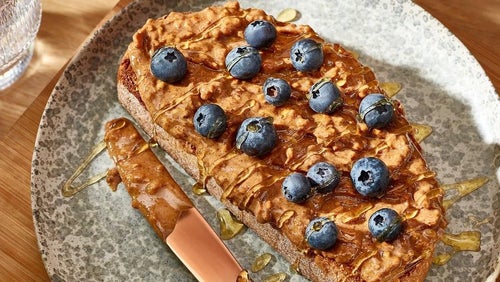
10 Best Pre-Workout Foods: What to Eat Before Exercise
What should you eat before the gym? A nutritionist reveals all ... ...
Hydration
Most athletes know to drink water during their workout, but the importance of drinking water (and other fluids) before your workout is often overlooked. The American College of Sports Medicine recommends “pre-hydrating” with fluid intake for several hours before working out — specifically, about half a liter (two cups) four hours prior to exercise and about an additional 1 and 1/4 cups (300ml) within half an hour of your workout.7
Although water is typically sufficient, consuming a source of sodium can help your body retain the fluid if you’re planning a long endurance workout (more than an hour) or if you suspect you could be dehydrated.7
Evidence shows that performance suffers when we’re in a dehydrated state, so it’s important to consume plenty of water before exercise — especially since prolonged sweating causes dehydration.
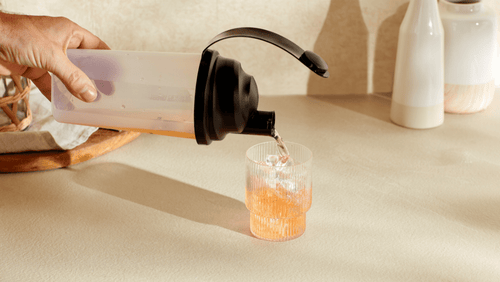
How Much Water Should I Drink A Day?
It possesses more power than you think....
Take Home Message
Considering what to eat before the gym can take a bit of effort — you have to take into account when you plan to exercise, for how long, and what the goals of your workout will be.
It’s crucial to consume an overall healthy diet, with adequate carbohydrates, healthy fats, and protein to keep your body performing at its best. Customize your pre-workout meals and snacks based on your goals, and keep in mind that supplements (and plenty of water with them) can also help maximize the results of your hard work in the gym. For more customized advice, you can seek out the advice of a sports dietician.
FIND MORE HERE:
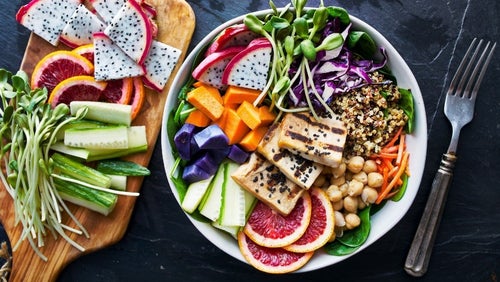
8 Vegan Pre-Workout Foods That Are Scientifically Backed
Plant power to push you through the toughest workouts....
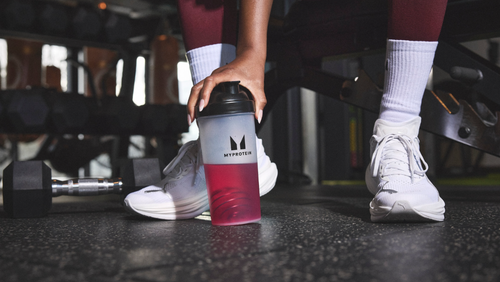
Nutrition for Muscle Growth: How Much Protein Do You Need?
All your protein questions answered....

10 Reasons Why You Bloat & How To Minimize It
Expert tips from a nutritionist....

Claire is a Registered Dietitian through the Academy of Nutrition and Dietetics and a board-certified Health and Wellness Coach through the International Consortium for Health and Wellness Coaching. She has a Bachelor of Science in Biology and a Master’s degree in Clinical Dietetics and Nutrition from the University of Pittsburgh.
Talking and writing about food and fitness is at the heart of Claire’s ethos as she loves to use her experience to help others meet their health and wellness goals.
Claire is also a certified indoor cycling instructor and loves the mental and physical boost she gets from regular runs and yoga classes. When she’s not keeping fit herself, she’s cheering on her hometown’s sports teams in Pittsburgh, or cooking for her family in the kitchen.
Find out more about Claire’s experience here.
- Antonio, J., Kalman, D., Stout, J. R., Greenwood, M., Willoughby, D. S., & Haff, G. G. (Eds.). (2009). Essentials of sports nutrition and supplements. Springer Science & Business Media.
- Tipton, K. D., Elliott, T. A., Cree, M. G., Aarsland, A. A., Sanford, A. P., & Wolfe, R. R. (2007). Stimulation of net muscle protein synthesis by whey protein ingestion before and after exercise. American Journal of Physiology-Endocrinology and Metabolism, 292(1), E71-E76.
- Schoenfeld, B. J., Aragon, A. A., Wilborn, C., Urbina, S. L., Hayward, S. E., & Krieger, J. (2017). Pre-versus post-exercise protein intake has similar effects on muscular adaptations. PeerJ, 5, e2825.
- Lowery, L. M. (2004). Dietary fat and sports nutrition: a primer. Journal of sports science & medicine, 3(3), 106.
- Kreider, R. B., Wilborn, C. D., Taylor, L., Campbell, B., Almada, A. L., Collins, R., … & Kerksick, C. M. (2010). ISSN exercise & sport nutrition review: research & recommendations. Journal of the international society of sports nutrition, 7(1), 7.
- Spradley, B. D., Crowley, K. R., Tai, C. Y., Kendall, K. L., Fukuda, D. H., Esposito, E. N., … & Moon, J. R. (2012). Ingesting a pre-workout supplement containing caffeine, B-vitamins, amino acids, creatine, and beta-alanine before exercise delays fatigue while improving reaction time and muscular endurance. Nutrition & metabolism, 9(1), 28.
- Sawka, M. N., Burke, L. M., Eichner, E. R., Maughan, R. J., Montain, S. J., & Stachenfeld, N. S. (2007). American College of Sports Medicine position stand. Exercise and fluid replacement. Medicine and science in sports and exercise, 39(2), 377-390.

